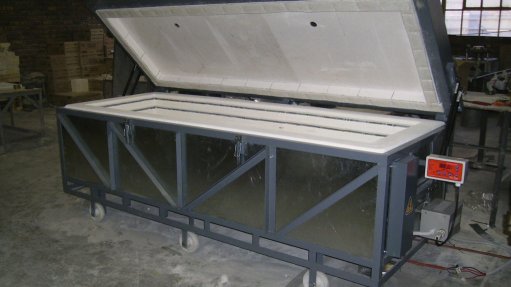
UNDER PRESSURE Manufacturers of furnaces and kilns are are changing their products and diversifying into new markets both locally and internationally
Furnaces and kilns manufacturers are taking strain, as with many other industries, owing to financial difficulties amid the current economic climate, says furnaces and kilns manufacturer Van Tuyls director and owner Richard McCullough.
Heindicates that the number of manufacturers in the industry has declined in the past few years, while the remaining survivors have managed to adapt to the environment by changing their products and services and diversifying into new markets and industries both locally and internationally.
He says it is necessary to differentiate between the different categories of furnaces and kilns manufacturers, the first being the manufacturers of larger industrial furnaces (mainly gas or electric arc furnaces) that are used to process chrome, platinum, aluminium and steel. These manufacturers are normally international companies, however, there are some well-established local manufacturers. McCullough says this group is under pressure, as its main clients, such as the mining and steel industries, are struggling to maintain profit margins and, as a result, many cut back or put on hold “unnecessary” capital expenditure.
The second category comprises manufacturers who build electrical furnaces and kilns. Electrical furnaces and kilns are used in four main segments: the professional trades such as the likes of jewellers, dental technicians and laboratories – these professions need burn-out furnaces and small kilns to reach temperatures over 1 000 ºC; the artists and craft market for firing ceramics and glass work; the mining, engineering and chemicals sector for custom applications such as toolmakers who require heat to treat steel; and educational facilities such as schools and universities.
Managing Difficulties
McCullough asserts that for manufacturers to assuage the difficulties of the current environment, unless a company is serving a niche market and is content to continue doing so, manufacturers should consider using their expertise in other similar markets and new territories and ensure diversification is a key strategy for growth. “There is always an opportunity, it is just where to look for it.”
For example, the pottery and glass markets are facing economic headwinds, owing to the difficulties in raising financing for capital expenditure, coupled with pressure from cheap imports impacting the market. Subsequently, Van Tuyl developed a range of smaller kilns that can be used for different applications, and is currently working with the major banks to allow financing of their products. He believes these initiatives will help, and has seen the demand for smaller kilns on the increase.
Meanwhile, McCullough says there will always be a need to produce equipment that can generate heat and Van Tuyl is fulfilling this need through its current product offering. The company continues to develop new products and monitor international trends. He believes this will keep Van Tuyl from becoming another casualty of the current climate.
McCullough concludes that the production of heat in its basic form is “as old as the hills” – it is simply about converting the energy that a source provides into heat energy. He notes that opportunities for future developments in heat production do exist, however, for instance, improving the management of heat and using renewable-energy sources.